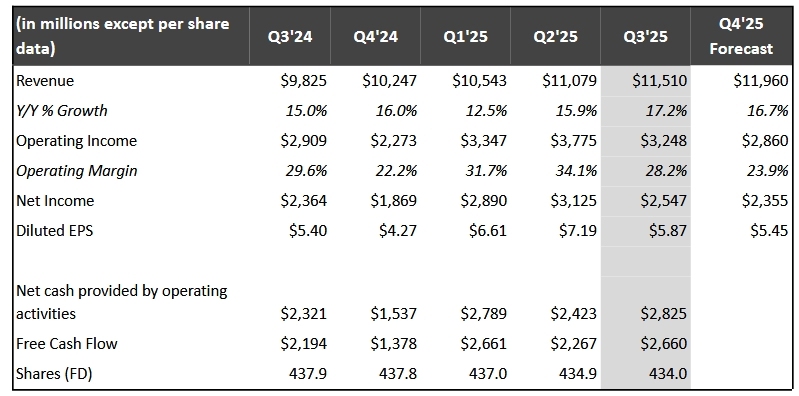Netflix Q3 Earnings: Brazil Tax Hit vs. Ad Revenue Growth Engine — A Mixed Report

TradingKey - Global streaming giant Netflix (NFLX) delivered a mixed third-quarter earnings report: revenue continued strong double-digit growth and accelerated from Q2, with record user engagement, content viewership, and ad sales — but a profit shortfall driven by a tax dispute in Brazil triggered an investor sell-off.
On Tuesday, October 21, after U.S. markets closed, Netflix reported its Q3 2025 results. Fueled by subscriber growth, pricing adjustments, and rising advertising revenue, the company posted revenue of $11.51 billion, up 17.2% year-over-year — slightly above Q2’s 15.9% growth and nearly in line with the expected $11.52 billion.

Key Financials from Netflix Q3 Earnings, Source: Netflix
However:
- Operating margin fell to 28.2% from 29.6% a year ago, missing its own guidance of 31.5%
- EPS rose 8.7% to $5.87, below both the $6.94 consensus estimate and guidance of $6.87
- This is a sharp slowdown from Q2’s 47.3% EPS growth
Netflix attributed the profit miss to a $619 million charge related to a long-standing tax dispute with Brazilian authorities dating back to 2022. While previously disclosed as a risk, this expense was not included in earnings guidance.
The market reacted swiftly, focusing on the weak profitability — sending Netflix shares down 7% in after-hours trading. Year-to-date, Netflix stock is up 39%, but has pulled back about 6% from its all-time high reached in late June.
Concerns over valuation (45x forward P/E), competition, and slowing profit momentum have caused Netflix to underperform the broader market and other tech giants since its peak — while the S&P 500 has risen 9% since then. The Q3 profit weakness only deepened that pain.
The Brazil Tax Hit — Not as Scary as It Seems
Netflix explained that the payment stems from a 10% tax imposed by Brazilian entities on certain payments made to foreign operations — a liability that had not been reflected in prior forecasts.
CFO Spence Neumann said this is not a Netflix-specific tax, nor one targeted at the streaming industry. The charge reduced operating margin by over 5 percentage points. Without it, Netflix would have exceeded its revenue and margin guidance.
Neumann added that they don’t expect this to have a material impact on future performance.
Taking the charge into account, Netflix lowered its full-year operating margin forecast from 30% to 29%.
Growth Story Remains Strong
Beyond the tax drag, Netflix delivered a fundamentally robust quarter:
- Record ad sales
- A single film setting all-time viewership records
- Strong free cash flow to support expansion
Company executives highlighted that the $7.99 ad-supported tier remains a key driver of long-term subscriber growth — and called Q3 the strongest ad sales quarter ever.
Ross Benes, analyst at EMarketer, confirmed:
“Netflix had its best ad sales quarter to date, but still did not provide a figure for how large the ad business is. This gives the impression that the sustained revenue growth achieved this quarter, and forecasted for next quarter, will predominantly continue to come from subscription fees.”
While subscription revenue still dominates, sustained growth in ad revenue and future outlooks will increasingly be fueled by advertising.
Launched in 2022, Netflix’s ad business is now on solid footing. Executives expressed growing confidence in its potential, projecting more than a doubling of total ad revenue in 2025.
Recent integration with Amazon DSP expands ad reach, allowing advertisers easier access, flexible buying options, and better measurement. JPMorgan analyst Doug Anmuth said this move will accelerate advertiser adoption.
Many analysts expect Netflix to deliver a stronger Q4 as the ad business gains real traction.
In Q3, the animated hit KPop Demon Hunter became Netflix’s most-watched film ever, with 325 million views — showcasing the platform’s power to turn lesser-known IPs into global sensations.
With major series like Stranger Things and The Witcher set to return in Q4, analysts believe these releases will continue driving subscriber and revenue growth.
Despite high content costs and the Brazil tax hit, Netflix remains financially strong, raising its full-year free cash flow forecast by over 9% to around $9 billion.
M&A Ambitions Amid Media Consolidation
As media speculation swirls around a potential acquisition of Warner Bros. Discovery, Netflix has hinted at interest — joining Paramount as another possible bidder.
While not naming Warner Bros. directly, Co-CEO Greg Peters said that looked at every significant opportunity.
“We got a clear framework to evaluate those opportunities and we’ll do whatever we think is best to grow the business.”
He added that they had no interest in owning legacy media networks.
Bank of America warned that further media consolidation — including deals involving Paramount — could intensify competitive pressure on Netflix.







